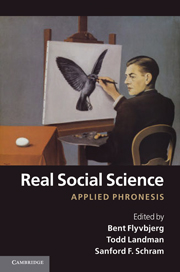Book contents
- Frontmatter
- Contents
- Figures
- Tables
- Contributors
- Acknowledgements
- 1 Introduction: new directions in social science
- Part I Theory and method
- 2 Phronetic social science: an idea whose time has come
- 3 Phronesis and narrative analysis
- 4 The feel for power games: everyday phronesis and social theory
- 5 Phronesis, projects and power research
- Part II Applied phronesis
- 6 Why mass media matter and how to work with them: phronesis and megaprojects
- 7 Power and conflict in collaborative research
- 8 Unsettling a settler society: film, phronesis and collaborative planning in small-town Canada
- 9 Phronesis and critical policy analysis: Heathrow's ‘third runway’ and the politics of sustainable aviation in the United Kingdom
- 10 Amnesty in the age of accountability: Brazil in comparative context
- 11 Feminist phronesis and technologies of citizenship
- 12 Making the teaching of social justice matter
- 13 Spatial phronesis: a case study in geosurveillance
- 14 Important next steps in phronetic social science
- Index
- References
1 - Introduction: new directions in social science
Published online by Cambridge University Press: 05 June 2012
- Frontmatter
- Contents
- Figures
- Tables
- Contributors
- Acknowledgements
- 1 Introduction: new directions in social science
- Part I Theory and method
- 2 Phronetic social science: an idea whose time has come
- 3 Phronesis and narrative analysis
- 4 The feel for power games: everyday phronesis and social theory
- 5 Phronesis, projects and power research
- Part II Applied phronesis
- 6 Why mass media matter and how to work with them: phronesis and megaprojects
- 7 Power and conflict in collaborative research
- 8 Unsettling a settler society: film, phronesis and collaborative planning in small-town Canada
- 9 Phronesis and critical policy analysis: Heathrow's ‘third runway’ and the politics of sustainable aviation in the United Kingdom
- 10 Amnesty in the age of accountability: Brazil in comparative context
- 11 Feminist phronesis and technologies of citizenship
- 12 Making the teaching of social justice matter
- 13 Spatial phronesis: a case study in geosurveillance
- 14 Important next steps in phronetic social science
- Index
- References
Summary
There is ferment in the social sciences. After years of sustained effort to build a science of society modelled on the natural sciences, that project, long treated with suspicion by some, is now openly being rethought. A critical intervention in this period of reflection was Making Social Science Matter (MSSM) by Bent Flyvbjerg, published in 2001. In that book Flyvbjerg challenged the very idea of social science as a science modelled on the natural sciences. Flyvbjerg argued that, as the social sciences study human interactions that involve human consciousness, volition, power and reflexivity, attempts to build generalizable, predictive models such as those for the natural world are misplaced and even futile.
MSSM offered a pointed argument about what is wrong with the social sciences today, and enumerated examples of how what it saw as an alternative social science is possible and already happening. The book provided a thorough analysis of how its alternative social science is dedicated to enhancing a socially relevant form of knowledge, that is, ‘phronesis’ (practical wisdom on how to address and act on social problems in a particular context). Significantly, MSSM reinterpreted the Aristotelian concept of phronesis to include issues of power and explained that building on this new version of phronesis is the best bet for the relevance of the social sciences in society. Intelligent social action requires phronesis, to which the social sciences can best contribute and the natural sciences cannot with their emphasis on ‘epistemé’ (universal truth) and ‘techné’ (technical know-how). This Aristotelian tripartite distinction of ‘intellectual virtues’ was critical in MSSM for highlighting the comparative advantage of social science. Even in Aristotle's original interpretation, phronesis is seen as the most important of the intellectual virtues, because it is needed for the management of human affairs, including the management of epistemé and techné, which cannot manage themselves. Phronesis, in this sense, is knowledge that is sensitive to its application in specific settings and is therefore able to manage itself (and more), which is what gives it prominence in social thought and action.
- Type
- Chapter
- Information
- Real Social ScienceApplied Phronesis, pp. 1 - 12Publisher: Cambridge University PressPrint publication year: 2012
References
- 20
- Cited by



